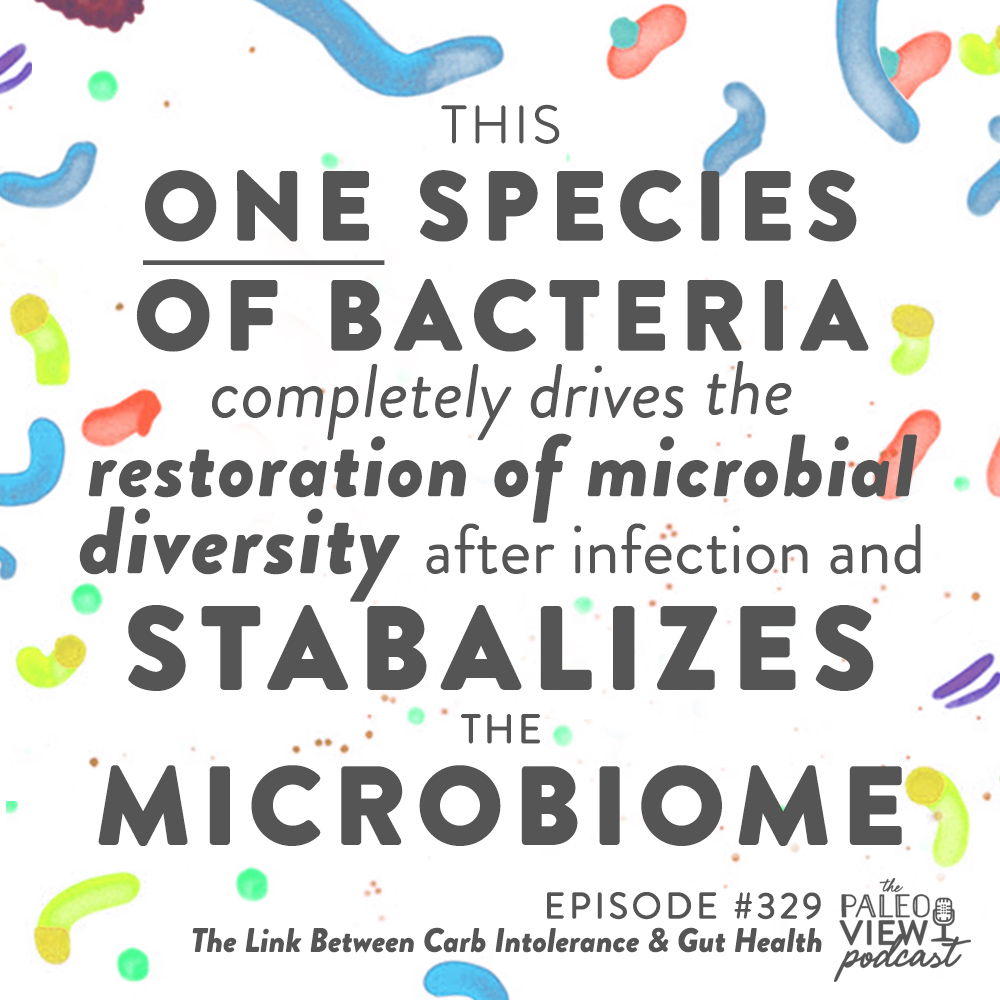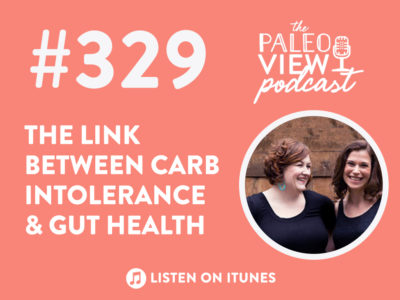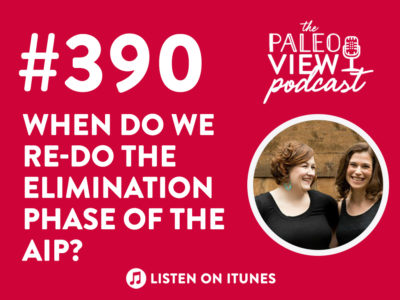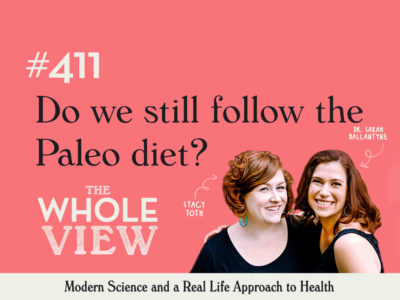In this week’s episode, Sarah and Stacy are addressing a reader question by diving into the connection between carb intolerance and gut health. What exactly is gut dysbiosis? What are most important foods for your gut microbiome health? Why are some bacteria species necessary for carb digestion? And what are the best types of probiotics to support a healthy gut?!
Click here to listen in iTunes
or download and listen by clicking the PodBean Player below
![]()
If you enjoy the show, please review it in iTunes!
The Paleo View (TPV), Episode 329: The Link Between Carb Intolerance & Gut Health
-
- (0:00) Intro
- (0:40) News and views
-
- Even though Sarah has a PhD, she sometimes has trouble using a coffee maker. Stacy’s coffee maker, to be specific!
- It’s challenging
-
- (3:45) Thanks to our podcast sponsor Just Thrive Probiotic, Sarah’s recommended brand!
- Just Thrive Probiotic is giving our amazing listeners 15% off with code PALEOVIEW15 at thriveprobiotic.com/thepaleoview!
- Just Thrive probiotic is made from soil-based organisms which are very unique. They’re from the genus, Bacillus, which is very resilient and capable of surviving in a wide variety of environments.
- As our lives are getting more hygienic from being inside and rarely playing in the dirt, so we’re getting fewer and fewer of these important bacteria.
- These are spore-forming bacteria which makes them very resistant to stomach acid. You can actually cook with this probiotic because it’s resilient up to 400+ degrees.
- Normal bifidobacteria and lactobacillus don’t usually take up resident in your gut. Just Thrive’s Bacillus probiotic, however, survives and populates your gut!
- Sarah is impressed by Just Thrive because they do their research and they really care about getting it right.
- Stacy notes that it can be hard to notice a difference when you start taking a probiotic. She personally notices a reduction in her sugar cravings when she uses Just Thrive.
- Just Thrive is dairy-free.
- Always check with your doctor before starting a new supplement.
- (16:30) Listener question
- TeeDee says:“Be glad if you’re still able to tolerate fruits, vegetables and anything that is fermented, cultured, aged, etc. I was going along quite well on paleo, then low carb, until I started to get a serious reaction to various foods. I had eliminated gluten a couple years ago when I found out it can be bad for people who’ve had their gall bladder removed (I had mine out at 19 yrs and am now 61) or who have issues with ibs or skin problems (rashes, hives, psoriasis). Cutting it out helped a lot, then I started breaking out on my face when I would eat any dairy, including aged cheddar, butter, etc. My face would start burning up and develop inflamed pustules all over, so I gave up all dairy, too. I needed to lose weight, so I adopted a ketogenic diet very low in carbs, and that helped with certain digestive issues (for the most part, but not all the way); it also cleared up my psoriasis, improved my mood a bit (I’ve had periods of severe major depressive disorder since my late teens and panic disorder so bad I couldn’t step out my front door for years without my bowels emptying within seconds) and it allowed me to lose a good amount of weight when I kept fat intake on the lower/moderate side instead of high fat.Recently, however, the eruptions on my face were coming after eating small amounts of veg like several slices of cucumber, perhaps 2 or 3 cherry tomatoes with olive oil and apple cider vinegar in a salad. Even fruit or a pickle would cause it and I was at my wits end trying to figure out what had caused which outbreak. Finally, even spices on a piece of chicken such as granulated garlic or cayenne pepper could no longer be tolerated and I just wanted to cry as it seemed anything I ate triggered an outbreak. Something as simple as mineral water with ‘natural flavors’ like mango, etc. would cause it…chamomile tea, etc. etc. All had to be eliminated.Now, for the past 3 weeks, I can’t eat anything but meat, chicken, fish and water. No coffee, no teas of any kind, just water to drink. I haven’t tested all fish, but wild salmon is ok so far and I haven’t tested seafood yet (I think I’m still getting over the shock of what has progressed and don’t want another bad outbreak). I feel fine now, thankfully. I haven’t had an outbreak in the past 3 weeks and my digestion feels very good and mood is now much better, but I’m still a bit stunned to find myself in this position. So, as I said, if you can tolerate certain foods in your diet, be grateful and have the utmost respect for your health at all times. Keep at it and don’t let anyone pull you off track with junk foods, drinks, etc. just be happy to be healthy because it’s all we’ve got. Life is too short to mess with out health. All the best!”
- Stacy’s and Sarah’s hearts go out to TeeDee.
- (23:06) Gut Dysbiosis
- Ketogenic diets don’t provide enough fat to support a healthy gut microbiome.
- Sarah notes that when she and Stacy started their health journeys wanting to lose weight and get skinny, but their priorities have shifted to being healthy.
- As Sarah is writing her microbiome books, she’s discovering that eating vegetables for the fiber is of utmost importance.
- Sarah says it’s possible that what TeeDee is describing is an autoimmune condition called Hidradenitis Suppurativa.
- When people only feel good eating meat and water, it’s usually tied to gut dysbiosis.
- Researchers have tied the gut microbiome to just about every skin condition. This connection is the Gut-Skin axis. A variety of studies have changed gut microbiome composition via antibiotics, probiotics, or probiotics, and that has cured the skin condition.
- Like “leaky gut,” “leaky skin” is a thing. Your skin requires certain nutrients to be healthy like Vitamin A, D, Zinc, etc.
- (31:51) Quick summary of the most important things for gut microbiome health:
- A variety of vegetables
- Nuts and seeds
- Fish
- Don’t eat too much fat, especially saturated fat
- Mono-unsaturated fats and omega-3 polyunsaturated fats are good
- The microbiome responds to the hormone environment (stress = gut dysbiosis).
- Our gut microbiome needs us to eat Vitamin A, D, E, K1, and all the minerals because they can’t make them.
- Adequate protein
- Active lifestyle
- Sleep
- Exposure to a variety of new bacteria species
- (31:51) Quick summary of the most important things for gut microbiome health:
- (35:50) Why Bascillus-Based Probiotics
- If you experience complete carbohydrate intolerance (like TeeDee), what do you do?
- Bacteria helps us process carbs. When you’re missing this type of bacteria, your body can’t break carbs down, which can lead to a strange metabolism.
- One recommendation is to reintroduce these carb-processing bacteria back to your gut.
- One such bacteria, is Bascillus, a keystone species that holds everything together (like a keystone in an arch).
- Bascillus produces up to 800 antibiotics. Some of them will kill pathogenic bacteria, other will kill other specific bacteria. They control the growth of many bacteria strains.
- Bascillus ferments carbs and protein and turns those into food that other bacteria in the gut microbiome can eat.
- Bascillus subtilis completely drives the restoration of microbial diversity after infection and stabilizes the microbiome.
- There are 7 or 8 species of Bascillus that have been very well studied and have probiotic benefits. Just Thrive Probiotics contains 4 of these.
- Benefits of the Bascillus species in Just Thrive Probiotics:
- Bacillus subtilis HU58
- Bacillus indicus HU36
- Bacillus coagulans
- Bacillus clausii
- One study showed that using a probiotic containing the strains found in Just Thrive Probiotics for just 30 days helped to heal leaky gut.
- If you experience complete carbohydrate intolerance (like TeeDee), what do you do?
- (58:17) What this all means for TeeDee
- First, talk to your doctor.
- A potential protocol could look like:
- Take Just Thrive Probiotics
- Start to reintroduce fruits and vegetables to your diet via smoothies and soups (the fiber is partially broke down so they’re easier for your gut bacteria to ferment). Gradually increase exposure to vegetables, keeping intake below the level of problematic GI symptoms. A little gas is normal – it’s a sign of fermentation.
- Increase exposure to beneficial strains of Bifidobacterium and lactobacillus by eating raw fermented vegetables like sauerkraut.
- If your symptoms sound like the autoimmune condition try the Autoimmune Protocol.
- Switch to more seafood, olive oil, not too high fat.
- Test Vitamin D levels
- Stay hydrated (steer clear of alkaline water – our gut bacteria don’t like it)
- Get good sleep
- Be active but don’t over do it
- You may need to do stool testing (parasites, candida, severe dysbiosis, other infections like H. pylori) and/or SIBO testing to hone in on other possible culprits that won’t be fixed with probiotics, vegetables and seafood. If something turns up positive here, work with your doctor on antimicrobial protocols. Probiotics and a microbiome-supporting diet will still help, but need to be layered on top of other treatments.
- Stacy reminds you to always listen to your body and check in on what’s going on. Pay attention to your stools. It’s possible TeeDee isn’t producing much stomach acid because her body doesn’t need a lot of it to break vegetables down.
- Get your questions in! We want to hear from you! And there’s no end to questions we can answer and topics we can address!
- Engage on social media! That’s how we get feedback!
- Thank you for listening
Resources
Episode 140: The Danger of Ketogenic Diets
Episode 316: Is The Carnivore Diet Healthy?
Episode 305: Why Insulin Is Important and Awesome
Episode 301: Sunscreen, Sun Exposure & Sunburns










